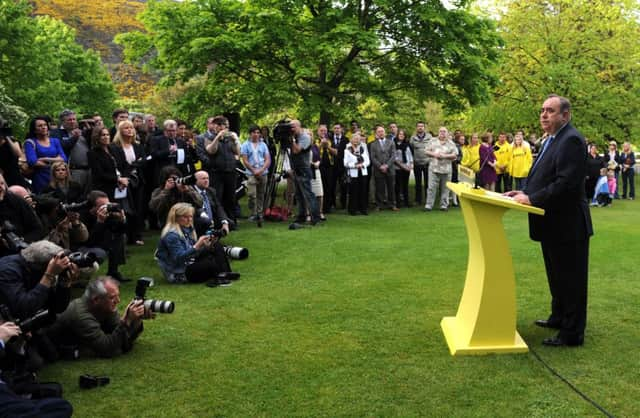Andrew Whitaker: SNP set to dominate Holyrood again


THE row over whether the SNP will push for a second independence referendum suggests that political attentions will soon shift back to Holyrood.
The SNP’s landslide victory in Scotland at this year’s general election and its emergence as the third biggest party in the Commons has inevitably meant the main event in Scottish politics in the last two-and-a-half months has been what has happening at Westminster.
Advertisement
Hide AdAdvertisement
Hide AdBut after Alex Salmond’s statement that a second referendum was “inevitable” and Nicola Sturgeon’s remarks that the SNP has yet to decide whether to back an independence vote in its 2016 Holyrood election manifesto, next year’s contest has been brought into sharp focus.
Opinion polls suggest the SNP is on course to become the first party under Scottish devolution to win a third successive term in government and is likely to keep its overall majority, as well as being in with a chance of taking all Labour’s remaining constituency seats, leaving the main opposition party with only list MSPs at Holyrood.
Such is the dominance of the SNP in Scotland, and so big is its poll lead over its main opponents, that its extremely unlikely at this stage that Labour will be able to recover from its meltdown north of the Border on 7 May and pull off a shock victory in next year’s Scottish parliament elections.
However, should there be any prevarication from the SNP in its manifesto come next year’s election campaign about its intentions on a second independence referendum, such uncertainty could gift Labour a chance of minimising its defeat or perhaps deprive the Nationalists of another overall majority at Holyrood – something that could effectively scupper any prospect of a second independence vote.
Should Kezia Dugdale, the favourite, win the race to succeed Jim Murphy as Scottish Labour leader it is possible that as a representative of a new generation she could land a few blows on the SNP over such uncertainty.
It’s worth remembering the SNP has form for leaving itself open to accusations of asking Scots to vote on an uncertain prospectus, such as when its White Paper on independence was criticised over the plan for an independent Scotland to retain the pound.
A newly elected Scottish Labour leader who performs well may also be able to go on the attack with some success if the SNP was to commit to a second referendum, with a line of how “more years of division” and “constitutional uncertainty” are the last thing Scotland needs so soon after the 2014 independence vote.
However, by the same token there is a strong chance the SNP will decide against going for a second independence vote if it wins a third term, and may opt to stick rather than twist.
Advertisement
Hide AdAdvertisement
Hide AdLosing the second referendum by a greater margin than in September 2014, when the Yes side was defeated by a margin of 55 per cent to 45 per cent, would be the political equivalent of a boxer narrowly defeated in a title contest who then goes on to be decisively defeated in the rematch.
A bigger defeat for independence in a second referendum, judged by some to have been held too hastily, or indeed simply a second referendum loss so soon after the first one, could be a knock-out blow for the independence movement for at least for a generation.
It’s one of the great unknowns of UK politics at the moment, but the SNP leadership’s dilemma may be sharpened by a view that the conditions for a second independence referendum may never again be so favourable for it, with a Conservative Westminster government intensely disliked by many Scots imposing deep welfare cuts and weakening employment rights north of the Border despite having just one MP in Scotland.
But it may not just be the independence issue that will come back into focus as attentions turn towards the 2016 Holyrood election battle.
If the SNP defeats Labour for a third time next year, the Nationalists will have been the governing party in the Scottish Parliament for nine of the 17 years of devolution.
The SNP’s last two Holyrood victories were largely against the odds, with the narrowest of wins in 2007 and the election of a minority government with just one more seat than Labour, and an unexpected overall majority in 2011 just weeks after some polls suggested the party could be defeated.
As things stands there is absolutely no sign that the SNP is running out of political steam, but after a third election win and a lengthy period in power, parties can begin to experience difficulties in office.
Think of Margaret Thatcher’s dramatic downfall just over three years after her third successive election win in 1987 after she pressed ahead with unpopular policies such as the poll tax, at a time when the then prime minister appeared to believe the normal laws of policies about the prospect of defeat did not apply to her. This contributed to her eviction from office.
Advertisement
Hide AdAdvertisement
Hide AdAfter leading the Labour Party to a third successive and unprecedented victory in 2005, Tony Blair also fared badly with serial internal rebellions and coup attempts against his premiership, as the fall-out from the 2003 invasion of Iraq continued.
The SNP leadership, certainly during the Salmond years at least, has at times given the impression that the “normal laws of politics do not apply to it” and such an attitude may yet offer Labour hope of revival.
However, such was the scale of the Nationalist triumph on 7 May and the ongoing popularity of the SNP government, that despite a questionable record in areas such as further college funding and NHS treatment times, the party could still continue to dominate Scottish politics in the way the centre right parties Fianna Fáil and Fine Gael have done in the Irish republic.